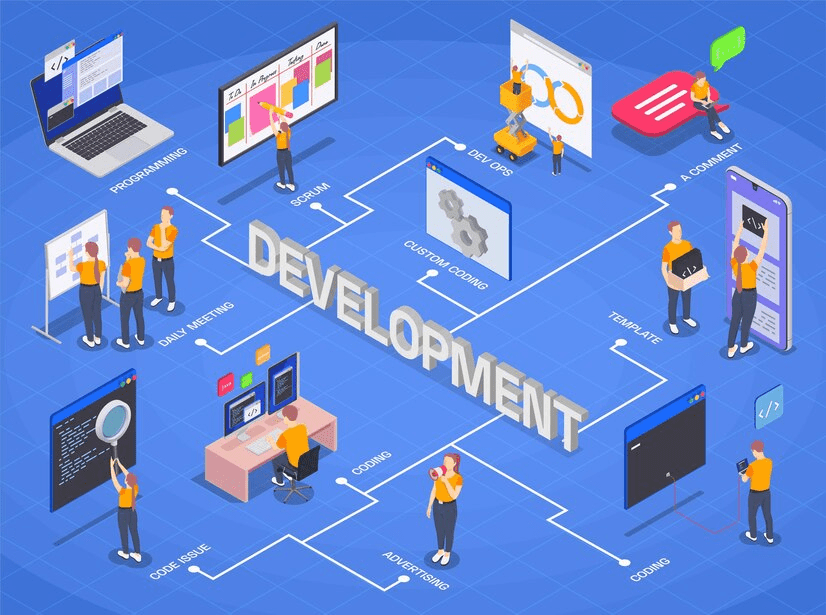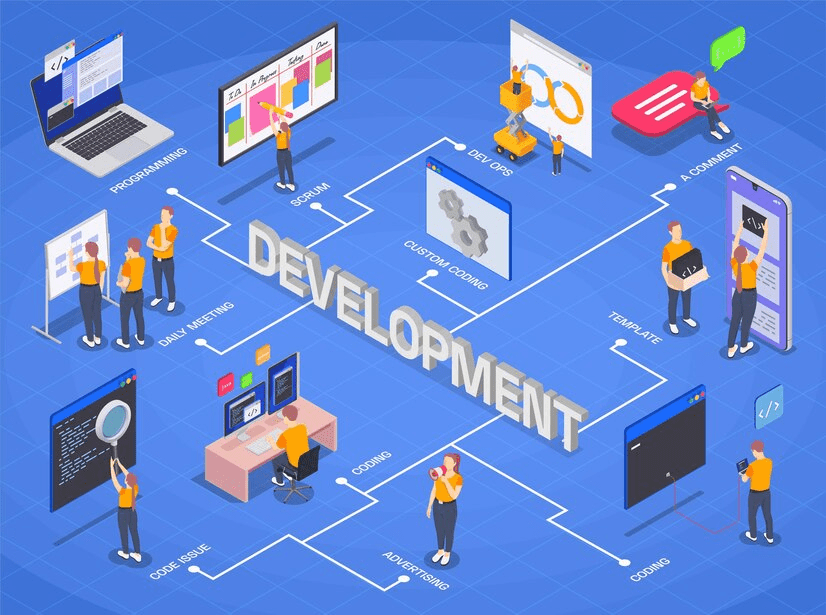In today’s rapidly evolving tech landscape, the roles of software engineers and software developers often intertwine and overlap, yet they hold distinct responsibilities and skill sets. Both these terms are often confused to mean the same and are used interchangeably but that’s not true!
For organizations , distinguishing between these two roles is essential to ensure the right fit for specific projects and company needs. While both contribute significantly to the creation of software products, their approaches, scope of work, and areas of expertise can vary markedly.
This blog aims to demystify these roles, providing clarity on how they differ and intersect in the tech industry. Understanding these nuances is key in helping you choose between software developers or engineers to bring your digital dreams to life.
Defining the Roles
At the core, both software developers and engineers work towards the same goal: creating functional and efficient software. However, their approaches and responsibilities can vastly differ. Let’s begin with understanding the primary difference between their roles and responsibilities.
- Software Developers are primarily focused on the coding aspect of software creation. They are the architects of the code, translating software design into a functional application. This role involves:
- A deep understanding of programming languages.
- Code writing.
- Debugging.
- Maintaining software.
Developers are often seen as creative problem solvers, taking a concept and turning it into a usable product.
- Software Engineers, on the other hand, take a more holistic approach. They are involved in the entire lifecycle of software development, from planning and designing to testing and implementation. This role often requires:
- A broader understanding of system architecture.
- Algorithm design.
- Large-scale data processing.
Engineers are responsible for considering the system as a whole, ensuring that the software integrates seamlessly into existing networks and platforms.
While there is considerable overlap, the key difference lies in scope. Developers tend to focus more on specific tasks or sections of the software, whereas engineers look at the project from a systematic, holistic perspective.
Skill Sets and Specializations
Now, let’s move on to the other key differentiating aspect which is the skillset. Gone are the days when qualifications and experience were the limelight of a CV. Now, skillsets also hold a prominent share in the hiring funnel. Many also look for these differences before rolling out any job description for such candidates.
The skill sets and specializations for software developers and engineers also differ, often reflecting the scope of their roles.
- When you hire software developers, they are expected to have a strong command of specific programming languages such as Python, Java, or C++. Their skill set is often more focused on the practical application of these languages in software development. They are adept at using development tools and environments, and their expertise is usually more concentrated on specific types of software or platforms.
- Software Engineers often possess a broader skill set that includes knowledge of software architecture and design patterns. They are expected to have an understanding of algorithms, data structures, and system design. An engineer’s role may also require project management skills, as they often oversee the development process from conception to deployment.

According to the U.S. Bureau of Labor Statistics, the demand for these skills continues to grow, reflecting the increasing complexity and scope of technology projects. As a result, both roles require ongoing learning and adaptation as technology evolves, but the engineer typically needs a broader range of technical knowledge and project management skills.
Educational Background and Career Paths
Depending on the title, the educational background and career paths for software developers and engineers also vary. Some common career paths include:
- Software Developers often hold degrees in computer science, information technology, or related fields. Many are self-taught or have completed coding boot camps. Their career progression often involves specializing in particular programming languages or industries, such as mobile app development or fintech.
- Software Engineers are more likely to have formal education in software engineering, computer engineering, or systems engineering. This educational background provides a comprehensive understanding of the software development lifecycle and systems thinking. Career advancement for software engineers often involves moving into senior technical roles or into management positions where they oversee entire development teams or projects.
Both career paths offer opportunities for advancement and specialization, but the trajectory can vary based on the individual’s interests, skills, and educational background.
Industry Trends and Demand
The demand for software developers and engineers is robust, driven by continuous advancements in technology and an increasing reliance on digital solutions across all sectors.
- Industry Trends: The rise of fields like artificial intelligence, machine learning, cloud computing, and the Internet of Things (IoT) has significantly influenced these roles. Software engineers, with their broader skill set, are well-positioned to lead projects in these emerging areas. Meanwhile, software developers with specialized skills in specific programming languages or platforms are in high demand to execute these innovations.

- Market Demand: According to the U.S. Bureau of Labor Statistics, employment in software development roles is projected to grow much faster than the average for all occupations, reflecting the ongoing digital transformation in many industries. Companies seeking to stay competitive in this landscape are looking to hire software developers and engineers who can contribute to innovative and efficient software solutions.
For businesses, understanding these trends is crucial when hiring. Aligning the specific skills and roles of software developers or engineers with the company’s technological needs is key to driving success in the digital era.
Scenario-Based Approach for Better Understanding:
Imagine this: You’re at the helm of a thriving startup, ready to embark on developing a cutting-edge app that you believe is the next big thing in the tech world. You have two paths in front of you: one leads to hiring a software developer, and the other to a software engineer. Which path do you choose?
Scenario A: Your project is focused on creating an app with intricate, specific functionalities. You need someone who can dive deep into code and bring these functionalities to life with precision and creativity. Here, a software developer with hands-on coding expertise is your ideal choice.
Scenario B: Your vision is broader. You’re not just building an app; you’re crafting a complex software ecosystem that requires meticulous planning, architectural design, and integration of various technological components. In this case, a software engineer armed with a wide-ranging skill set and systemic thinking will be your guide.
Key Takeaway: Your project’s nature and scope should dictate your hiring decision. Whether it’s the detail-oriented craftsmanship of a developer or the architectural vision of an engineer, understanding your project needs is the compass that leads you to the right talent.
Closing Thoughts
As you stand at the crossroads of innovation and growth, the choice between whether to hire software developers or engineers is more than a mere decision—it’s a strategic move that shapes the future of your tech endeavors.
Remember, every great tech story begins with the right team. Whether it’s the meticulous code crafted by a developer or the visionary design of an engineer, your next hire could be the catalyst that transforms your ambitious vision into a tangible reality. So, take this knowledge, embrace the journey ahead, and make that decisive hiring step.
Author Bio:
For such content and more, feel free to contact Colton Harris (founder of attractivepost.com ). He’s a highly experienced SEO expert with over 5 years of experience. His extensive knowledge and expertise in the field and has helped numerous businesses and individuals to improve their online visibility and traffic. Harris writes and publishes content on business, technology, finance, marketing, and Cryptocurrency-related trends. He is passionate about sharing his knowledge and helping others to grow their online businesses. You can reach him via email ID: coltonharris573@gmail.com.
